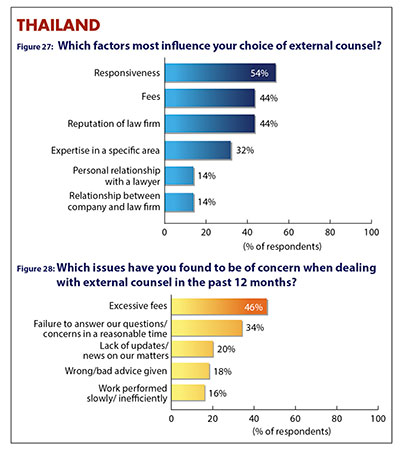 This year’s In-House Community industry representation in Thailand has Energy/Natural Resources and Manufacturing, each with 18 percent, tied for most responses. Technology, Media and Telecommunications comes in third (with 16 percent) and Financial Services fourth (with 12 percent). Counsel employed by Fast-Moving Consumer Goods coumpanies provided the fifth-highest number of respondents with eight percent. Team size As was the case 12 months ago, the majority of in-house lawyers in Thailand believe their teams will remain the same size over the next year (62 percent). Though budgeting and economic concerns were given as reasons for this, the majority of respondents were content with their current team size, as most said they had sufficient in-house resources and saw no need to expand. Of the remaining, 30 percent anticipate in-house growth, while eight percent are under the impression that their teams will shrink. Expanding business and legal work were the main reasons people expected to see their teams grow, with one remarking that familiarity with the company would be crucial, therefore having in-house counsel would be preferable. The determining factor as to why people thought their teams would shrink was budgetary constraints. Recruitment KEY ISSUES AND CONCERNS “Convincing all employees, including top management, [of the] importance of legal & compliance,” remains a challenge. Some also said they felt the need to look outside the jurisdiction for expertise in their industry as there was no one with enough experience domestically available. International issues that participants thought would be of concern over the coming 12 months were not all related to ASEAN, as China was mentioned too. In fact, issues on the international stage were at the forefront of the minds of almost all respondents, with only a few noting domestic issues: a sign that Thailand’s In-House Community is largely anticipating internationalisation over the coming year. Working with external counsel Many of those anticipating an increase in work dealt with externally said this was due to incoming projects and business expansions, some related to the ASEAN Economic Community. Those expecting to use outside help less said this was due to both cost and wanting to hire more in-house counsel and deal with issues internally. In-house counsel that saw no need for increased reliance on outside counsel overwhelmingly claimed that this was because they don’t use them on day-to-day issues and they did not foresee anything out of the ordinary in the near future. The most persuasive factor when Thailand’s In-House Community chooses external counsel is responsiveness (54 percent). Fees and law firm reputation are the second-highest influences, each being important to 44 percent, while expertise in a specific area – usually top priority – is fourth at 32 percent. (Figure 27) Excessive fees are the number one concern for in-house counsel in Thailand when referring work to external counsel, as stated by 46 percent of those surveyed. A failure to answer questions and concerns in a timely manner has been an issue found by 34 percent and 22 percent said external counsel often fail to completely understand their business. One fifth also noted a lack of updates on matters. (Figure 28) |
THAILAND
88
previous post

